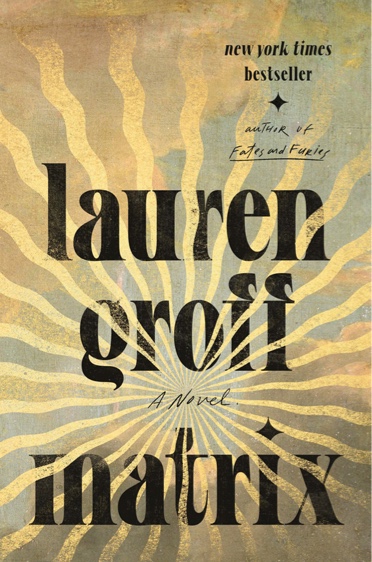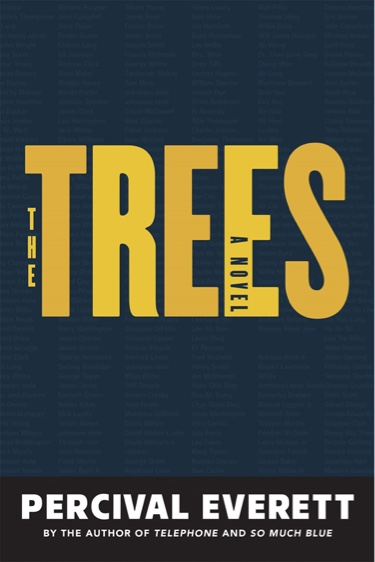-
March 22, 2022
Quarterfinals
-
Lauren Groff
1Matrix
v.
2The TreesPercival Everett
-
Judged by
Lynn Steger Strong
I hate writing book reviews. I love writing book reviews. I have never written a book review in which at some point I did not feel certain I was the dumbest person to ever read a book or write about it, that I didn’t ask a friend or agent, sometimes the editor of the newspaper, if I should simply pull the review and never speak or write again. This is worse than a book review because I’m being asked to give a personal opinion on two incredibly accomplished books.
“Opinion is the wilderness between ignorance and knowledge,” said Plato, purportedly (not really) but also Misty from the show Yellowjackets, pretending to quote Plato. My opinion on that show is that I like it very much.
Both Matrix and The Trees are historical novels by writers at the top of their game. Both are capable of pyrotechnics, Groff most notably at the level of the sentence, Everett with all the many ways he continues to upend and reconsider form.
Matrix is impressive in terms of both ambition and scope. We meet 12th-century Marie de France as a teenager, “tall, a giantess of a maiden, and her elbows and knees stick out, ungainly.” A “bastardess sibling of the crown” with “no godly vocation whatsoever in any way, at all,” Marie is sent by Eleanor of Acquitane (with whom she is in love) to take charge of a sickly, decrepit nunnery at 17.
After a short bout of self-pity, Marie devotes her life to the flourishing of this place and its inhabitants, cultivating the land and this clutch of women, protecting and defending themselves and their property from marauding men. The cloistered, cutoff nature of the book’s world elicits some of its greatest pleasures: It’s from other women that the tension comes, the attraction, the sex, the pushback when some of them feel that Marie has overstepped. It’s a book about female ambition and power—basically my own personal catnip—about the inherent transgression and thrill, but also the limits and contradictions of it. “The need to enlarge this abbey she has thought of as an extension of her own body. Her actions always in reaction to the question of what she could have done in the world, if only she had been given her freedom.”
I often think books are too long, but my major quibble with Matrix was that it was somehow too short, or maybe that the weight of its attention didn’t shift often enough. The book spans so much time and there’s much to admire about the distilled feeling of the novel. I had the thought throughout that Groff had written maybe 100,000 words for every 20,000 she kept in. I always get the sense, reading a Lauren Groff novel, that she is deeply conscious of what she’s offering the reader, that she is taking care to give them something sure.
Bright and warm, the covers of these Memo Books are heavily debossed with graphic patterns based on flowers that are among the very first to appear each spring, and then stamped with three luscious, reflective foils. The dot-graph insides are made from a superb paper from Strathmore.
Available now in 3-Packs and as part of a year-long subscription.
In opposition to so many books that go on for pages for perhaps no apparent reason beyond the writer wanted to, Matrix moves in a consistent, concretely distilled rush. While I read, this often felt impressive, one moment compiling on another, but the result was I never felt fully ratcheted in the way I hoped. I yearned for scenes to be more fully cracked open—and they were all lush, all evocative and sensual—but I kept waiting for the impact of moments to shift more fully, for the book to slow down and say to me somehow, this, here, pay closer attention, but we just kept moving through.
While Matrix dives into the history of a mostly unknown figure, jumping off the particular cliff of not much direct source material, The Trees engages with the opposite and perhaps more difficult task, of enmeshing in a history so known that it might have felt impossible at first to make new. (But then Everett does not often give off the impression of thinking nearly anything impossible.)
The Trees (a noun that refers as much to heritage and the way both trauma and culpability is passed down as it does to lynchings) enters the world of Emmett Till. It’s present-day Money, Miss., 73 years since Till was tortured and murdered by Roy Bryant and JW Millam, both of whom were acquitted for the crimes. But our characters and the first of our (many) murder victims are these mens’ descendants. At each scene, and the bodies pile up quickly, there is also the body of a Black man holding the murder victim’s testicles. That body keeps disappearing from the morgue then reappearing, then replicating itself. The Mississippi Bureau of Investigation and the FBI are called in. These same types of murders, different cities, different bodies and different recurring bodies, begin to appear across the US.
The book is part mystery, part buddy comedy, wholly itself: You want to know what happened, but it’s shifted because of how the book toys both with character and its relationship to reality. I’d have bought the murderer was a ghost, but also a vision: The book acted on me in such a way that I would have believed just about anything.
The tone here is also ever-changing and specific: Many of the white characters (both “White” and “Black” are capitalized in the book) are absurd caricatures; you don’t so much mourn their deaths or worry for them as you look forward to the jokes Everett will get in at their expense before they’re gone. But then the book is also deadly serious, laced through with a near-constant lacerating rage. Here is Mama Z, the 103-year-old grandmother, who has spent her life documenting every lynching, starting with her father’s when she was a child. “Your book is very interesting,” she says to Damon Thruff, an academic, who writes on the same topic, “because you were able to construct three hundred and seven pages on such a topic without an ounce of outrage.”
Throughout the novel, Everett displays an incredible alacrity with shifts in register, with tone and humor, that thing where you’re laughing alongside the writer, in on the joke, you think, until the weight of what you’ve seen so far can hit at even greater force, until, even while you might still be laughing, you also feel the rage, you also feel the immeasurable tragedy.
Both of these books are filled with mastery and erudition. Both are admirable by virtue of how very much they took on. Perhaps my biggest criteria for novels is that they feel like nothing else I’ve read and both books also managed that. There’s so much sad and shitty in the world; so many books are so earnestly enmeshed in their own certainty and self-seriousness. The winner is The Trees, because in addition to all its many other accomplishments, it also made me laugh.
Match Commentary
By Kevin Guilfoile & John Warner
Kevin Guilfoile (he/him): Judge Strong felt a lot of things reading these novels, as I did, and does a lovely job expressing her emotional journey to a decision. Ultimately the ToB comes down to this or that. You must choose. So often, it is barely a feather of a notion that drops one side of the scales, and you feel that’s the case here. As Judge Strong notes, Matrix is an epic tale (it has a straight-up battle scene!), spanning decades, but described with spare, expertly drawn strokes. You really do feel it could have been 500 or 800 pages, it could have been like Wolf Hall or The Name of the Rose or something, and that novel would have been great, too.
I was fascinated by all the decisions Groff made with this novel and had fun imagining all the different ways the story would have evolved if she had turned any of those dials this way or that—if the book had given more page time to Marie’s adversaries, for instance, or expanded even more on the daily details of abbey life. But Groff is such a confident writer and inspires so much faith in me as a reader. This is the best possible version of this novel because it’s the one she chose.
John Warner (he/him): The material feels fully inhabited to me, which is how I think we get to the place where something spare in size can be drawn out of events and themes and feelings that feel epic.
Kevin: And yet, The Trees. I like that Judge Strong prefers books that “feel like nothing else I’ve read.” Many readers of fiction have the inverse criteria. They want novels that feel exactly like the books they’ve already read. I understand the appeal of novels that are like comfort food (I read them too), and I don’t mean to criticize any reader for why they read. Everyone has a right to enjoy the books they do, and we need more readers of all kinds. In a way both types of readers are after a similar thing. They are trying to recreate a good experience they had with a book. In Judge Strong’s case it’s the intense experience of discovering a novel that seems both true and new at the same time. That is exactly how The Trees made me feel, as well.
In fact, both of these authors seem especially intent on never writing the same book twice. We talked a little bit in a previous commentary about the ways Sally Rooney’s novels seem related to one another in terms of theme and character and mood. It’s almost as if Everett and Groff plot the stories of each of their novels on a graph—a matrix, if you will!—and when it’s time to write the next one they seek out a point as far away from all their previous novels as possible.
John: I really responded to that same notion from Judge Strong. I think it’s a really interesting way of articulating a criteria I think I hold to as well, which is that my favorite novels often feel sort of perfect—not flawless, per se— but exactly themselves, organic and whole. Sure I can get into something that’s well executed in exactly the way I’ve read before—I’m a big fan of the Reacher series, for example—but there’s something incredible about a book that just seems sui generis, and here we have two of them.
As much as I loved Matrix, for me The Trees is just a massive statement work of art that’s both attuned to the moment and feels like something enduring. I’m not sure what more anyone could ask of a book.
Kevin: I don’t think it’s a tremendous surprise that Matrix is able to slip into the Zombie standings at this early stage. (For the uninitiated, I’m referring to the poll that Andrew and Rosecrans take each year, pre-ToB, to see which books are the audience’s favorites, which then determines which two titles have a chance at a comeback if they’re eliminated; full explanation here.) If the Zombie Round were held today, Klara and the Sun and Matrix would be required reading at Hyosan High.
New 2022 Tournament of Books merch is now available at the TMN Store. As a reminder, Sustaining Members receive 50 percent off everything in our store. To find out why we’re asking for your support and how you can become a Sustaining Member, please visit our Membership page. Thank you.
Welcome to the Commentariat
Population: You
To keep our comments section as inclusive as possible for the book-loving public, please follow the guidelines below. We reserve the right to delete inappropriate or abusive comments, such as ad hominem attacks. We ban users who repeatedly post inappropriate comments.
- Criticize ideas, not people. Divisiveness can be a result of debates over things we truly care about; err on the side of being generous. Let’s talk and debate and gnash our book-chewing teeth with love and respect for the Rooster community, judges, authors, commentators, and commenters alike.
- If you’re uninterested in a line of discussion from an individual user, you can privately block them within Disqus to hide their comments (though they’ll still see your posts).
- While it’s not required, you can use the Disqus <spoiler> tag to hide book details that may spoil the reading experience for others, e.g., “<spoiler>Dumbledore dies.<spoiler>”
- We all feel passionately about fiction, but “you’re an idiot if you loved/hated this book that I hated/loved” isn't an argument—it’s just rude. Take a breath.



